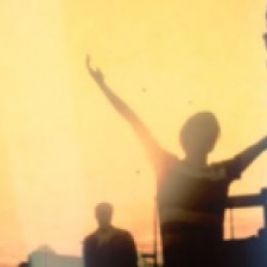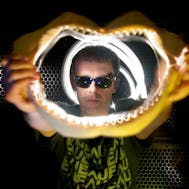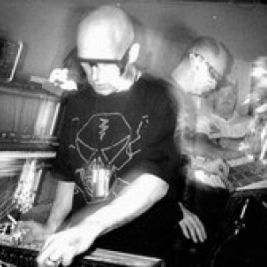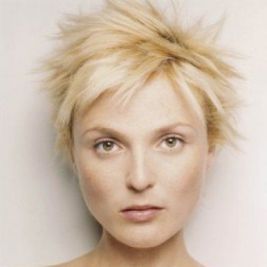
Sister Bliss Interview: Beyond gender, before equality
Ahead of her appearance at Beyond The Tracks, Martin Guttridge Hewitt caught up with Faithless' leading lady, about the rise, fall and rise of dance music and more.
Skiddle Staff
Last updated: 6th Oct 2017
Image: Sister Bliss (credit)
There are some interview questions that just need to be asked. Cliched as they may seem. Take speaking to someone like Sister Bliss, for example.
The leading lady behind Faithless, not to mention an esteemed, DJ in her own right, after spending well over two decades cementing her name in the pantheons of electronic music, you’d be hard pushed to find anyone who didn’t want to find out her thoughts on how the scene has changed, or not, with regard to women in the industry.
In between her relentless summer schedule that has had her touching down in more clubs, beaches, and fields than most would deem healthy, the release of her forthcoming track 'I Wanna Feel', featuring South London rapper Fem Fell, and another forthcoming single featuring grime don Wiley, we managed to grab a few minutes on the phone with the artist in question, real name Alayah Bentovim.
During the conversation, we ask if gender bias really was as bad as many would presume back in the day and if we’re ever going to reach a point when the sex of a DJ is no longer a relevant talking point.
How are you today?
I’m alright thank you.
How has summer been?
It has been excellent thank you very much. Lots of great shows and lots of travelling. Although it’s kind of sad as it feels like the beginning of the end now.
Any particular standouts?
Loads. Lots of great festivals, Exit in Serbia, I was in Mykonos last week on a beach, which was just fantastic. In the UK I kicked off the summer at Common People, which is quite a new festival, I’ve been incredibly blessed with the weather. Glastonbury was a highlight too, I had an awesome time there.
Having headlined the Pyramid stage a couple of times with Faithless weirdly I was extremely nervous to go back and DJ, I didn’t want to let people down. But it went off and was brilliant, so I needn’t have worried, and then I went off and danced to Goldie in a field under the giant spider that is Arcadia. So a brilliant, cathartic way to end my gig day, although I stayed for the weekend.
You’ve had this kind of schedule for a long time, how do you keep the energy up?
Well, I’m so rock n roll that on my rider there’s a jar of almond butter. And I like to eat it with a spoon, from the jar. I can highly recommend as an energiser, pre and post set. And also dark chocolate, great slabs of it. And try and build in enough sleep here and there when you can.
Sometimes you have to say no, too. There was one festival I would have loved to do this year but didn’t, I couldn’t have done the travel as I would have had to get all the way down the country from Kendal Calling. Even I just thought I’d kill myself. It wouldn’t have been good for me. The practicalities would have meant nine hours in a car, which is a trip to the chiropractor. There are no flights. So I knew if I would have said yes it would have put me in hospital. A back hospital, though, not a mental hospital.
The practicalities would have meant nine hours in a car, which is a trip to the chiropractor. There are no flights. So I knew if I would have said yes it would have put me in hospital. A back hospital, though, not a mental hospital.
You've witnessed the rise, fall, and rise of dance music in that time, where are we now?
You just couldn’t get a healthier scene at the moment, there really is something for everything. You still have the big EDM banger festivals, like Tomorrowland, but they are also broadening their scope and realising that’s perhaps a bit of a spent force, and some of the more major artists are moving back towards house again, and a slightly less generic sound maybe.
But you know techno is still going strong, tech house, festivals like Dekmantel, Houghton, Boomtown, a real eclectic mix. Sometimes it’s quite experiential, experimental even, theatrical, giving people, what can I say, mind-blowing times. Adult fun.
I think Glastonbury and Block 9, Shangrila, those kinds of places really pushed the boundaries of what was possible at a festival, and then others have taken and developed that. Almost creating a little world within a world, that you don’t want to leave. (You can read our interview with Gideön from Block9 here.)
So very healthy for festivals, I think the difficult side is, being a Londoner it’s something I’ve spoken of before, a lot of clubs closing down. And that’s not healthy. It’s where people cut their teeth, like me, smaller clubs, to bigger, graduating to festivals, then headlining. There’s a logic to it. Even Coldplay played to three people at the Dog and Duck before they were stadium straddling artists.
It breaks my heart to see so much being shut down, not because things move on, but because of property, land, gentrification and corruption. And that’s the bit I find deeply disturbing and short-sighted. I know that I still live here and pay a shitload of tax for the privilege. And there are lots of other people like me who started off on the dole and came out the other side to be really successful artists and want to contribute to this city and this country.
You’re really short-sighted if you’re cutting off the space for people to be creative and artistic because it generates billions for the economy. The global economy, specifically electronic music, never mind all the rocks bands. It’s absolutely crazy, and also pretty depressing, and so hard for the people who run the clubs now, it’s a real battle. People’s income is squeezed and they spend it at a festival.
So on the one hand the scene is ridiculously healthy, people are making music and being creative and it’s democratised, most people who are making music can just do it on a laptop, they don’t have to spend thousands and thousands on a studio. But when it comes to places you can play that music and have it aired, the iconic venues are being lost. It’s important to have venues for 200 people, and 500 people, or 1000, 1500. You can graduate from one to another.
It’s definitely worrying, isn’t it?
I remember it being a very significant thing when Faithless had a first gig at the Jazz Cafe. Sasha and Paul Oakenfold were stuck outside and we had to throw their tickets out the window so they could catch them. It was mad, it was that intimate but the great and good of dance music were there. And then graduating to the Astoria, which of course has gone because of Crossrail. But that was a key venue in London.
I’ve just been down to Margate, and Dreamland, the investment they have spent basically turning it into Hoxton-on-Sea, is outstanding. And it will become a huge hub. People will travel there. They are already moving to Margate. And they have a great set of graded venues. From 200, the Ballroom, to 500, to a 5000 capacity outdoor space. So it can be done, there is a market for it, and you can’t squeeze that out to make London a hedge fund city.
Female DJs have become much more visible in the last ten years, but it still feels as though by making the point we’re highlighting just how patriarchal the scene still is?
It will be a lovely thing when that doesn’t have to be mentioned. That’s the day equality has been reached. But there are advantages and disadvantages. There are a few shit-storms when record labels say they wouldn’t sign a female artist or whatever, I’ve noticed in my Facebook feed. But there are a hell of a lot more female artists now than there was when I started. And I think sheer visibility often will encourage people to take it up, regardless of gender.
Hopefully, the patronising attitudes of yesteryear will disappear. And by the same token, I’ve had a lot of respect and opportunities passed my way, but I’ve always felt I had to be 15 times as good as the nearest guy. Sometimes I hear people play and really don’t get why they are a DJ. I just think ‘fuck me, if I did that I’d never get away with it’. What can I say? So I still feel you have to make the effort, and show that, my god, she’s not just a dolly bird behind the decks. But after 25 years I’ve got the chops.
Was it really as bad as some stories suggest when you first started out?
No, no. I’ve experienced great kindness and a lot of respect and appreciation from promoters over the years. There was a few that were like ‘Oh, she really can mix’, from back in the day, but very little. I think it’s a sort of, what can I say, slightly more under the radar problem. So I’m probably not paid as much as the guys, even though I’ve had more hits than many of them put together. I don’t get how you can have someone who has made one hit record, and then they’re suddenly headlining a massive event.
You think ‘I’ve done ten of them, you’ve had one’. But that’s the way the industry works now. If I’d put out 'Insomnia' last year, and it had the kind of success it had now, it would be a different creature. And if I was 17 and a spring chicken, they might be like ‘I’ll pay you half a million to play in Vegas’, and that EDM game might have gone my way. But that does seem like a very distorted thing.
You mean the big money side isn’t really indicative of the scene in general?
Exactly, but I do think there’s probably an earnings disparity overall. Or there certainly was in my early days. But that’s also because I didn’t have a very pushy agent, and I was just very grateful to play. I remember Roger Sanchez saying years ago when we were playing together and he had a fantastic room and I had a little one. ‘Baby, you should have one of these rooms, these are cool.’ I was like, this is fine it’s got a bed. But I did think why haven’t I got that room. It’s an awful way to live, why not that, why this.
How many women are running things within the business? You can probably count on one hand your most powerful managers, agents. Record company people in the main will be men. There are people who are my peers, people like Caroline who was managing David Guetta, and Amy who was managing Swedish House Mafia.
So there are a few on the electronic scene who have absolutely given their artists their all and raised them to the very top of the game. But, in the main, it’s really men in A&R departments, having meetings, and being DJs, I suppose. So we’ll see when the balance changes. The bottom line is like all gender inequality it’s particularly economic based, I think.
I think in America it might be worse, I read an article where it was like ‘well if it’s a girl it’s gotta be two girls because we can sell two better than one’. You know, they are really looking at it like a business, an industry, which is a very different headspace to the one I was born into. I like to think it’s fantastic to make a living out of it, creativity and being an artist. Of course, you need to have something that’s marketable and people want to see, but what I love about England is there’s a quirkiness in our industry.
So you don’t have to be the most beautiful whatever. It’s easier if you’re male and not particularly good looking to be a very well respected artist, but there are many more twists and turns here. More of an outsider thing. It really is about the music; what they put out, and how they excite people. I love there’s a bit more of a democracy in that. And I guess that’s why people like me and the older generation are still going, and haven’t been kicked to the curb.
Sister Bliss plays a Faithless DJ set at Beyond The Tracks Festival in Birmingham on Friday 15th September, alongside Orbital, Leftfield, Jagwar Ma and more, you can grab tickets below.
Tickets are no longer available for this event
Read more news






























